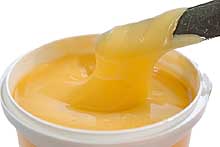Honey Nutrition Facts

Honey, the sweet, sticky substance created by a colony of bees, offers an excellent source of simple carbohydrates. For each tablespoon of honey consumed, the body is supplied with 64 calories of pure energy.
Honey is considered a natural substance, and according to the United States National Honey Board, it's a natural product that does not allow for the addition of other substances, such as water and sweeteners.
In the United States there are about 300 varieties of honey and each one differs depending on the floral source that the bees visit. Each type of honey not only has its own taste, but varies in color too. Generally, the lighter the honey, the milder the flavor.
Honey's composition, on average, is 17.1 % water, 82.4 % carbohydrates and 0.5 % proteins, amino acids, vitamins and minerals. The average carbohydrate content is mainly fructose (38.5 %) and glucose (31 %). The remaining 12.9 % of carbohydrates is made up of maltose, sucrose and other sugars.
Unlike most other sweeteners, honey contains small amounts of a wide array of vitamins, minerals, amino acids, and antioxidants. Vitamins in honey include vitamin B6, vitamin C, thiamin, niacin, riboflavin, and pantothenic acid. Essential minerals including calcium, copper, iron, magnesium, manganese, phosphorus, potassium, sodium, and zinc as well as several different amino acids have been identified in honey. One antioxidant called "pinocembrin" is only found in honey.
Honey is fat free, cholesterol free and sodium free.
Apart from its culinary and medicinal properties, honey has often been used as a metaphor by many famous people, including Abraham Lincoln who is quoted to have said, "The only reason for being a bee that I know of is making honey . . . and the only reason for making honey is so I can eat it."
Author: Dimi Ingle
Copyright: Remedium. This article may not be copied, in whole or in part, without the written consent of Remedium.
|